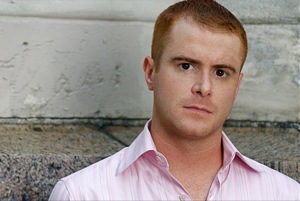Arts & Entertainment
The state of gay cinema according to Chuck
Published Thursday, 13-Nov-2008 in issue 1090
Chuck Griffith has two words for LGBT filmmakers: Try harder.
Not only is the award-winning director of 2001’s Thank You Good Night unimpressed by what gay directors are content calling cinema, he thinks they’re completely ruining the queer celluloid image.
And that’s putting it mildly.
“I’ve seen a lot, and what I’ve seen is horrific without any excuse for it,” explains Griffith, 33, whose TV credits include work on Six Feet Under and Judd Apatow’s ill-fated college comedy Undeclared. “Shelter was the milquetoast gay film of 2008, and while it had great production value and pretty solid acting, how many coming out stories do we need to see?”
Griffith, of course, is referring to director Jonah Markowitz’s boy-meets-man, boy-fall-in-love-with-man, boy-comes-out-to-family surf story that made the requisite festival rounds upon its release last year, racking up several awards including Best New Director at the Seattle Lesbian & Gay Film Festival and the Vancouver Queer Film Festival’s People’s Choice Award for Best Feature.
“Where’s the edge?” he asks somewhat rhetorically. “Where are the stories for the other 99 percent of the gay community that’s already out and doing something, [stories that are] worth telling in a compelling way?”
Hard-pressed to find an answer to that question, Griffith decided to takes matters into his own hands. But years after founding Roaring Leo Productions, a company that Griffith says is committed to “making films for people who love film,” the redheaded renegade still isn’t satisfied with how queer-themed movies have evolved.
“I feel like gay cinema is stuck in the ghettoized community of 1995, where the gay community was going through a celebration of being gay – an adolescence, if you will – in response to the AIDS crisis that brought on so much fear.
“I think that was fine back then, but with online social networking, the gay experience extends beyond Greenwich, Chelsea and Castro Street. Yet we’re making films for us to relive our early 20s rather than making films that help define the community we want to be in the future.”
That sentiment, in a nutshell, lays the foundation for Roaring Leo. According to Griffith, there was “a need in the film world for someone to help guide filmmakers through the process, to help them avoid the marketing pitfalls that I went through in making [Thank You Good Night].”
The company’s first project, a DVD titled Best of Breed: Volume 1, which was released earlier this year, features four shorts from four directors – Ethan Feldbau, Lou Peterson, Leah Meyerhoff and David Kagan – that push the limits of what audiences expect from traditional gay fare.
“The common theme explored in each film is the sensory experience,” Griffith says. “In [Feldbau’s] ‘Plastic,’ the young boy can’t deal with his own identity and must experience life through other people. ‘Encounter, [by Peterson], is about the sensuality that one can feel without touch. ‘Wonderful Sandwiches,’ [from Meyerhoff], is about using a barrier in order to achieve intimacy; and [Kagan’s ‘The Process’ is about the need and desire for touch.”
Because each of these films are examples of extreme illusion presented artistically, Griffith admits that Best of Breed isn’t for everyone; the DVD’s primary purpose is to get people talking about art in gay cinema. “These films are there to make you think, because I believe the gay community can think if they want to.”
Gay directors on the other hand, well, Griffith has all but given up hope. He hasn’t, however, given up on the gay consumer. His suggestion? Invest in filmmakers trying to do something different.
“It doesn’t take much,” he says. “Just go and find something that does more. And if one can’t invest themself, write letters to Here! [TV] and TLA [Realeasing]. They’re worried that no one wants to see anything better than A Four Letter Word and Eating Out 2, so that’s what you’re gonna get.
“It’s up to the consumer to do something about that.”
|
|
Copyright © 2003-2025 Uptown Publications


